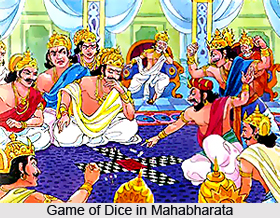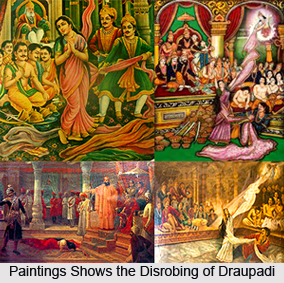 Dice Match was a consequence of Duryodhana"s embarrassment at the Rajasuya Sacrifice held by the Pandavas. Duryodhana was also rankled by the events of the Pandavas` great wealth and the tribute which was attained by the Pandavas, the new recognition of their paramountcy by other kings, Duryodhana held council with his three most intimate advisors: Dushasana, the second oldest and vilest of his ninety-nine brothers; Karna, his loyal friend ever since he appointed him king of Anga; and Shakuni, his maternal uncle, brother of the Kauravas` mother, Gandhari.
Dice Match was a consequence of Duryodhana"s embarrassment at the Rajasuya Sacrifice held by the Pandavas. Duryodhana was also rankled by the events of the Pandavas` great wealth and the tribute which was attained by the Pandavas, the new recognition of their paramountcy by other kings, Duryodhana held council with his three most intimate advisors: Dushasana, the second oldest and vilest of his ninety-nine brothers; Karna, his loyal friend ever since he appointed him king of Anga; and Shakuni, his maternal uncle, brother of the Kauravas` mother, Gandhari.
Dushasana compares Duryodhana to the moon that has paled before the Pandavas` sun and he advised poison, treachery, or cunningness to defeat them. Karna, vaunting his own prowess, advised heroic action. But Shakuni, reminding Karna how little his prowess gained for him at Draupadi`s Swayamvara, says it would not be possible to defeat the Pandavas in battle even in seven births. They can only be defeated by treachery and cunning, for which he is himself renowned. Accordingly, he advises Duryodhana to build a mandapa and invite the Pandavas to a game of dice, at which he will win everything from them.
The plan delighted Duryodhana, who flattered Shakuni and then, recalled his humiliation at the Rajasuya, breaks into a most astonishing and ominous vituperation of Draupadi. After this interlude, the mandapa is built, and the virtuous Vidura, the Kauravas` junior paternal uncle, is summoned for his consent to the trickery, which he refuses. Decrying the plan, he suggests that all Duryodhana needs to do is send a letter to the Pandavas from Dhritarashtra, the Kauravas` father, requesting their kingdom, and the Pandavas will willingly give it.
The epics say that the scene having shifted to Indraprastha, Vidura arrives at the Pandava court and is greeted with rites of hospitality: Dharma and Arjuna perform pada puja, washing his feet. He praises the Pandavas and Draupadi, but delivers his message in tones of grief. The letter, he says, is not just an invitation to see a mandapa. Yudhisthir intuits its hidden meaning, and decries the practice of dice for warriors, saying it is one of the five great sins. The four younger Pandavas urge Yudhisthir to decline the invitation, but Dharma says that neither a father`s word nor fate can be circumvented.
As the Pandavas arrive at Indraprastha Duryodhana shows off the mandapa to the Pandavas, finally suggesting the game of dice. Dharma, Bhima, and Arjuna speak out vociferously against it. But Shakuni and Karna force them. But Yudhisthir insists on calm and agrees to play, saying that dharma will triumph in the end and that a person of forbearance will rule the earth.
 Yudhisthir Starts Losing in the Game of Dice
Yudhisthir Starts Losing in the Game of Dice
The dicing is reduced to four rounds, with Shakuni cavorting at each victorious throw and Yudhisthir sitting impassively amid mounting gloom, and others showing characteristic reactions. As elsewhere, the first stake is a "garland of pearlsâ€, presumably a symbol of sovereignty, which Yudhisthir removes from around his neck and places on the ground for Shakuni to give to Duryodhana. The second bet all the Pandavas` wealth, wagered over thirteen throws in the Sanskrit epic, into one toss. The third wager, lost in one throw rather than the five of the Sanskrit, is for the five Pandavas themselves, including Dharma, with the condition that the brothers now become Duryodhana`s slaves. Upon losing this throw, the five stand in line before Duryodhana. Yudhisthir then laboriously removes portions of his upper apparel: his epaulettes, outer shirt, and the cloth wound around his head to support his crown. And then each of the Pandavas relinquishes his most characteristic possession: Dharma his crown, Bhima his mace, Arjuna his bow, Nakula his horse, and the scholarly Sahadeva a sashtra.
The last stake is, of course, Draupadi herself. This time it is not Shakuni who sets the stakes, but Duryodhana. This is a departure from both the Sanskrit and Tamil epics, which attribute this final wager to Shakuni. Duryodhana`s own desire for Draupadi is soon cited by Shakuni as the reason for this bet, is thus exposed, along with his determination to humiliate her. The throw is made and Draupadi is lost. After this Duryodhana orders Dushasana to drag the "wanton woman†in by the hair.
Cheer Haran of Draupadi
Dushasana then seized Draupadi by her hair. With mounting violence, Dushasana swung Draupadi about in circles, dashed her to the ground so that she rolled over and over, her hair swirling in the dust. Draupadi lamented painfully. They exchanged insults. Several times this cycle is repeated, until finally he dragged her before the court. Draupadi appeals to the elders, who remain silent, and berates her husbands for their passivity.
Duryodhana then orders the ultimate insult. Duryodhana first give Dushasana the command to remove the Pandavas` garments, as well as Draupadi`s saree, so as to break her pride. The Pandavas remove their own upper garments, and Draupadi laments the loss of their royal dignity. When Vidura protests the commanded disrobing of Draupadi, Duryodhana`s rage only grows hotter.
When Dushasana removes the first saree, it is tied to another, and so on and so on, while she continues her supplication. Lord Krishna holds the end of a yellow saree that drapes down over Draupadi`s shoulder. It represents the source of all the other sarees. Dushasana keeps pulling the linked sarees from between Draupadi`s feet and under the curtain until they litter the entire stage ground with a burst of brilliant and varied colours. Dushasana is astonished, horrified. He attempts to measure the sarees` length, flings and kicks them about, hurls more insults. Finally possessed and totally exhausted, he collapses.



















